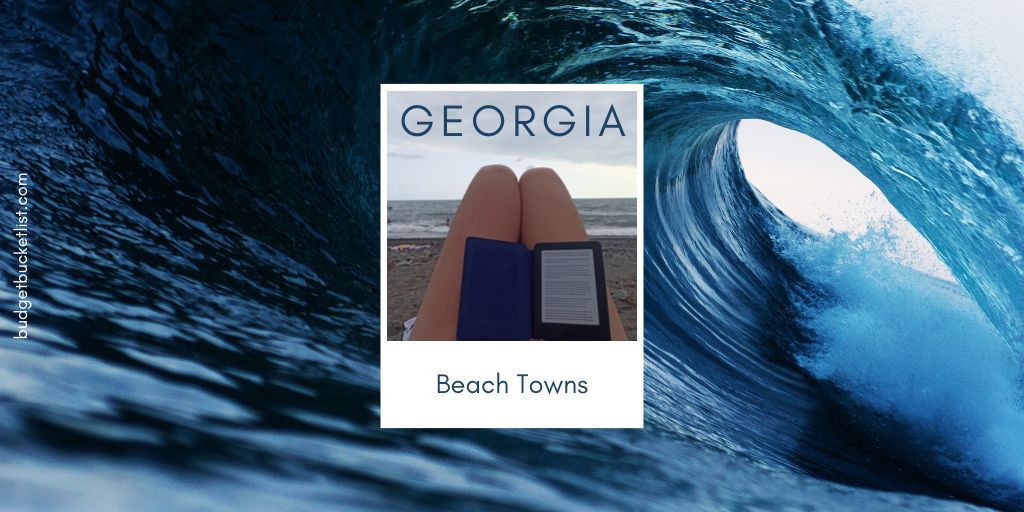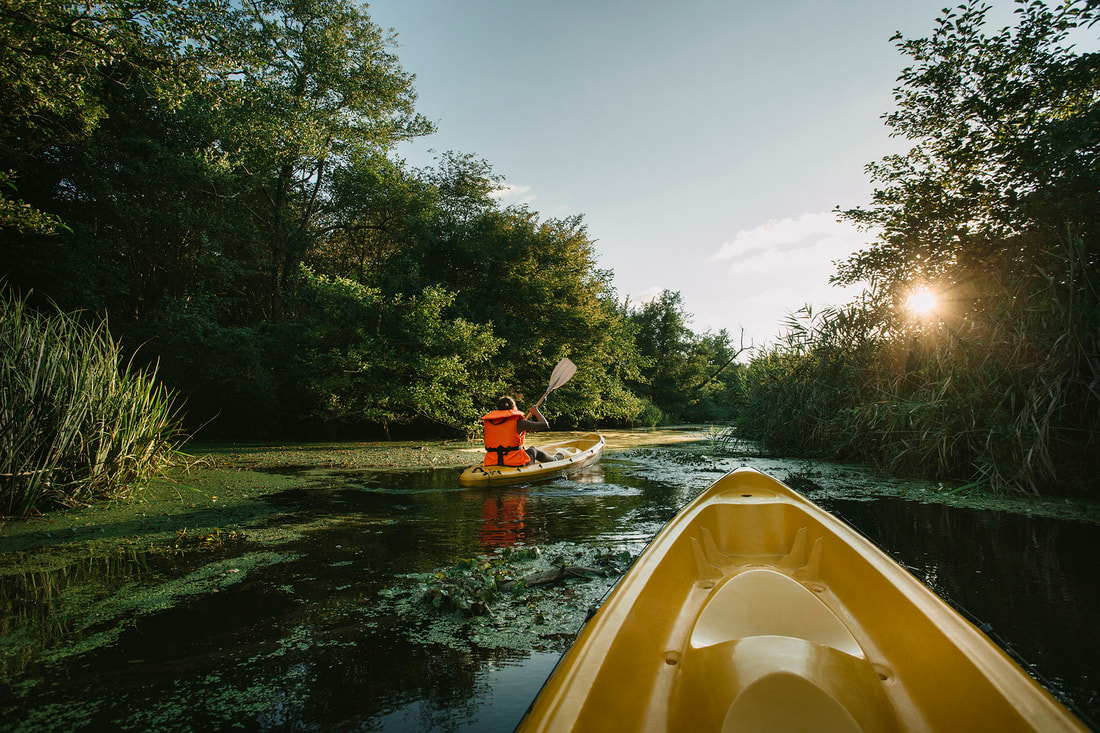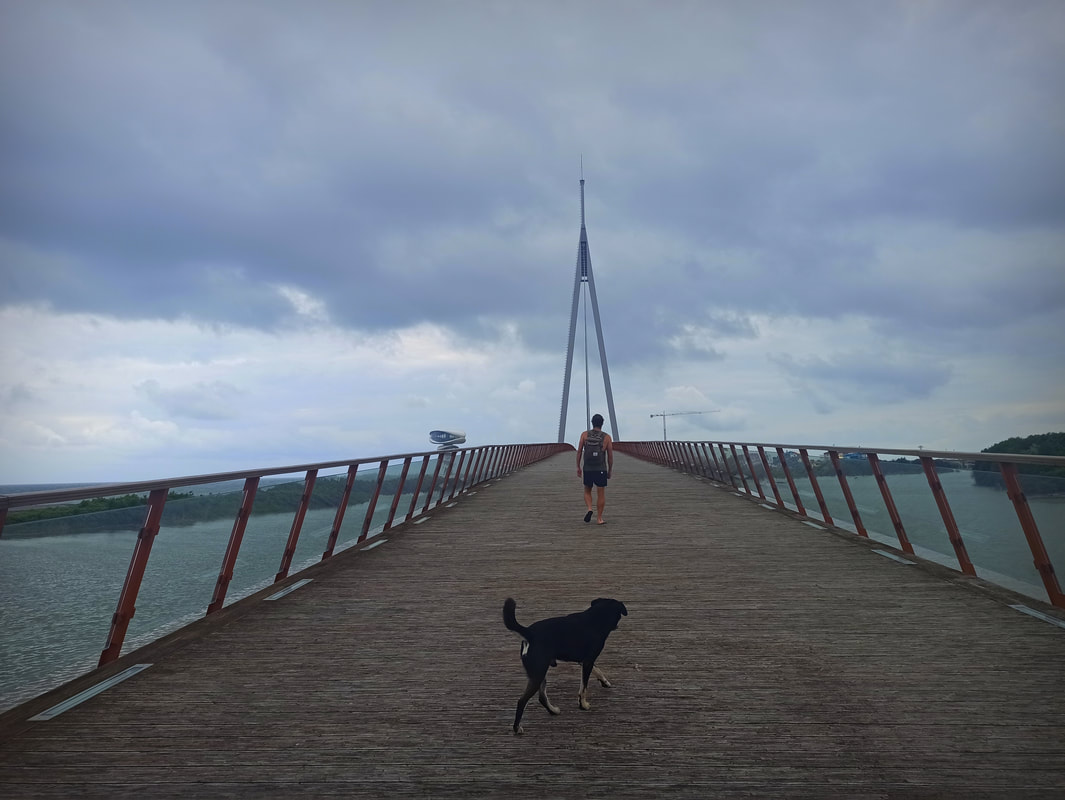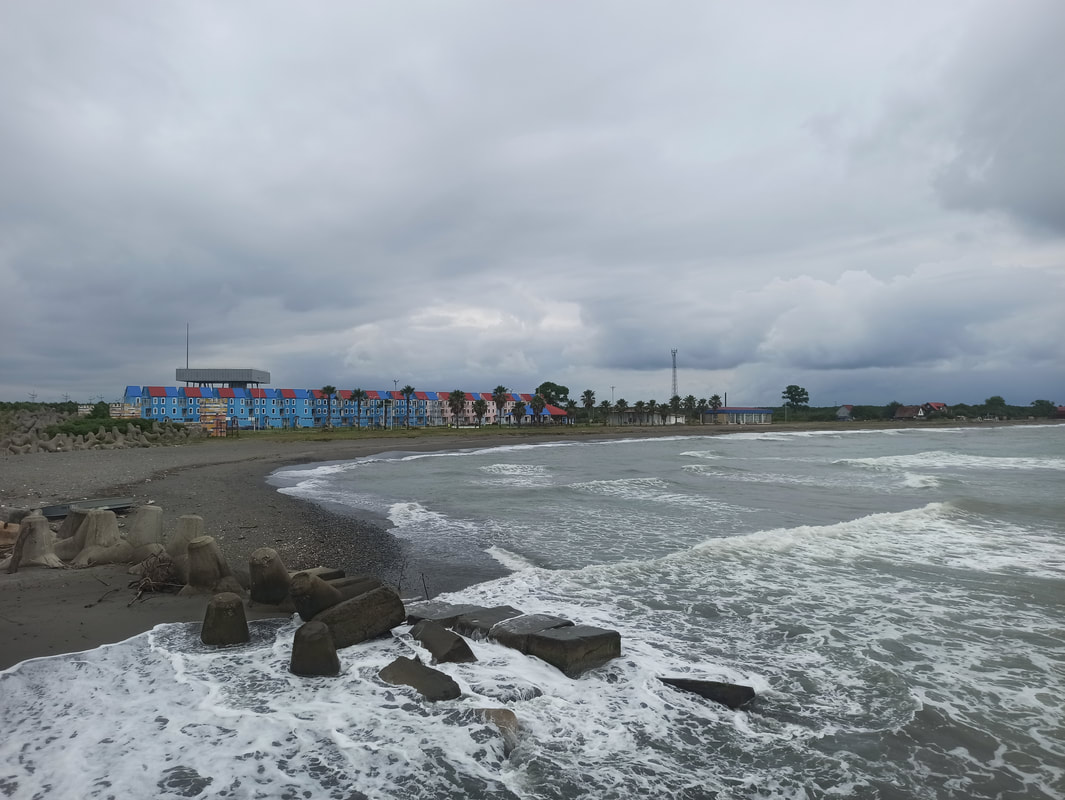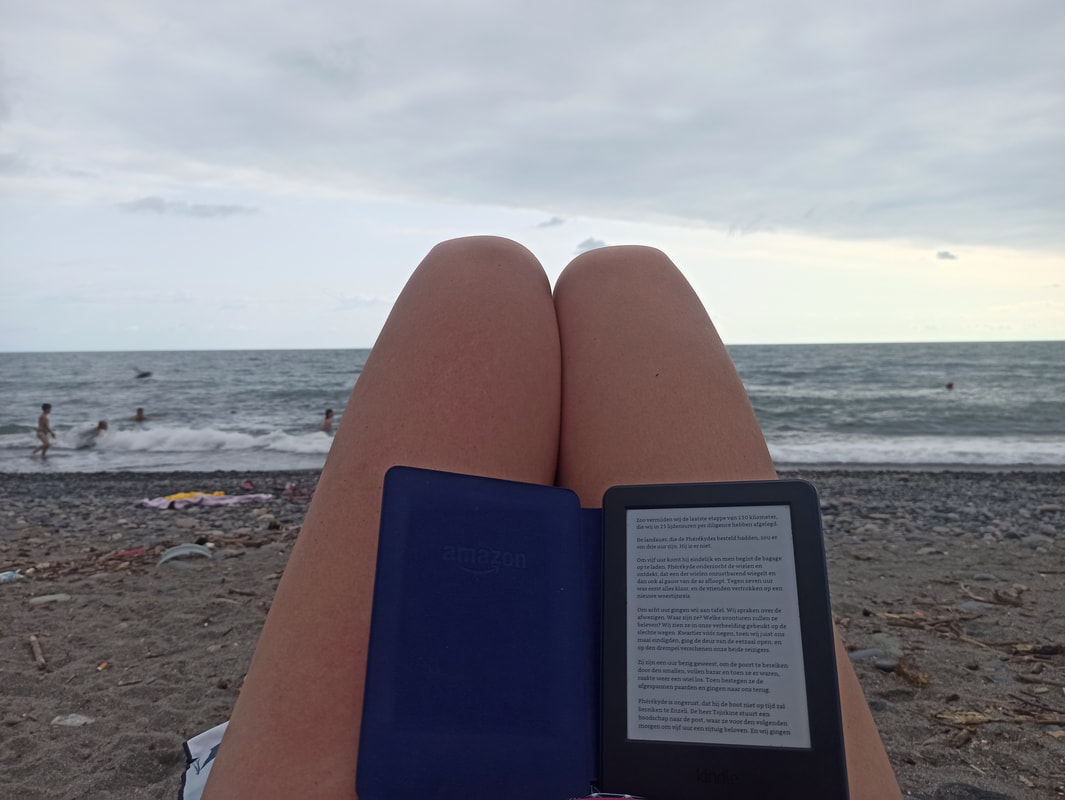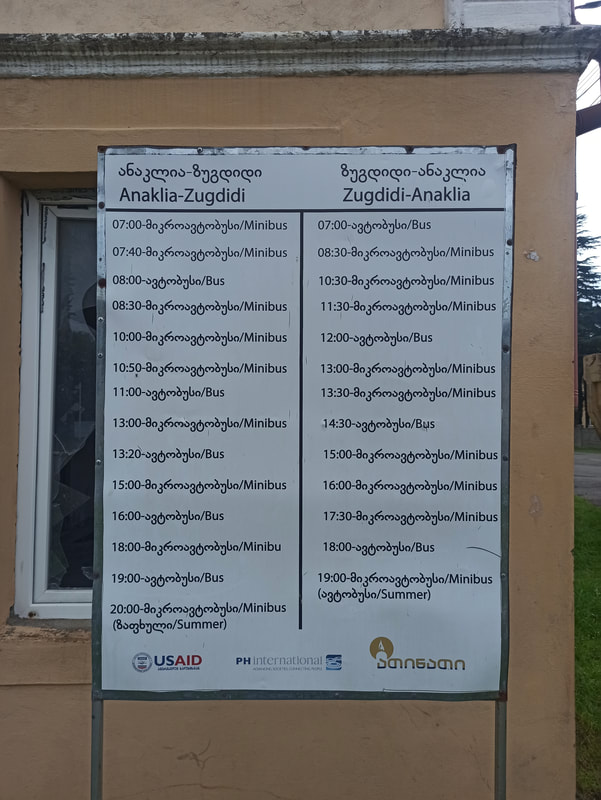Beach Towns of Georgia
Not in the story-mood? Scroll down for the Quick Budget Fact Overview: an itemized information summary! ↓
Georgia is a remarkable travel destination for many reasons. This fairly undiscovered country has many exciting elements wrapped in its modest size: A fascinating history and culture marked by ancient old civilizations, a unique viticulture, a mouth-watering culinary scene, as well as an endless array of picture-perfect hiking trails belonging to the Greater Caucasus. And yes, as it borders the Black Sea it has some coastline too. Don’t get too excited though… whereas it’s definitely impressive for Georgia to check off the full nature-cities-beaches-travel-bingo, their shores are rather underwhelming. Expect dark sometimes-stony beaches, black muddy waters (“Black” Sea for a reason) and unfortunately, a bunch of trash left by humankind. That said, if you (like me) crave to break up the ongoing trekking adventures with a little salty plunge here and there, it will do the job.
Let’s dive deeper into Georgia’s shore – what have they got in store for us sun-searching travelers?
Let’s dive deeper into Georgia’s shore – what have they got in store for us sun-searching travelers?
Anaklia
I spent an unreasonably long time in Anaklia (7 days), a forlorn beach resort at walking distance from the border of Russia-occupied Abkhazia. Especially considering it was raining the whole week through (causing the coast guards to forbid swimming altogether), with only a few splashes of sunshine here and there to keep my hopes up. It looks like once upon a time Anaklia would have been worth it, as there certainly were big plans for this destination. No costs nor efforts seemed to have been spared for its redevelopment, resulting in an 8km-strip of (greyish) man-made sand beach, lavish 5* beachfront hotels, high-end restaurants, a yacht harbour, wide palmtree-dotted bicycle- and pedestrian lanes, tennis- and basketball courts, a festival ground, a waterpark, modern art works, a long state-of-the-art pedestrian bridge, and even small visitor-friendly details such as trash bins, showers, ample parking lots, and their very own Baywatch-team. What happened!? Covid? The Russian conflict? All the promising renovation works seemed to have suddenly halted, resulting in the visible decay of construction works that weren’t even finished yet. Anaklia is now a slightly overgrown ghost town of grass-covered building carcasses, rotting woodwork and harbours clogged by mud and moss. A gloomy posterboy of “what could have been.” The last festival happened in 2018, the road to the Kolkheti National Park (the main attraction in the area) remains unfinished. Yet, on any given sunny weekend it encounters a little splurge of local tourism, the Zugdidi residents flocking together for that welcome stretch of coast they have in their backyards… and that short experience of local escapism, which is so different from the cities or the mountain chains, felt like it was worth my while. Not the mention the best dog of Georgia, who resides in Anaklia.
I spent an unreasonably long time in Anaklia (7 days), a forlorn beach resort at walking distance from the border of Russia-occupied Abkhazia. Especially considering it was raining the whole week through (causing the coast guards to forbid swimming altogether), with only a few splashes of sunshine here and there to keep my hopes up. It looks like once upon a time Anaklia would have been worth it, as there certainly were big plans for this destination. No costs nor efforts seemed to have been spared for its redevelopment, resulting in an 8km-strip of (greyish) man-made sand beach, lavish 5* beachfront hotels, high-end restaurants, a yacht harbour, wide palmtree-dotted bicycle- and pedestrian lanes, tennis- and basketball courts, a festival ground, a waterpark, modern art works, a long state-of-the-art pedestrian bridge, and even small visitor-friendly details such as trash bins, showers, ample parking lots, and their very own Baywatch-team. What happened!? Covid? The Russian conflict? All the promising renovation works seemed to have suddenly halted, resulting in the visible decay of construction works that weren’t even finished yet. Anaklia is now a slightly overgrown ghost town of grass-covered building carcasses, rotting woodwork and harbours clogged by mud and moss. A gloomy posterboy of “what could have been.” The last festival happened in 2018, the road to the Kolkheti National Park (the main attraction in the area) remains unfinished. Yet, on any given sunny weekend it encounters a little splurge of local tourism, the Zugdidi residents flocking together for that welcome stretch of coast they have in their backyards… and that short experience of local escapism, which is so different from the cities or the mountain chains, felt like it was worth my while. Not the mention the best dog of Georgia, who resides in Anaklia.
|
|
|
Talking about Zugdidi*… if you’re either going to visit Anaklia or Svaneti (preferably both), you will pass through it. It’s worth considering a little stopover, be it for a little lunchbreak or to spend the entire day. Honestly, arriving hungry is the best approach when dealing with Zugdidi, as this destination is valued for its scrumptious Mingrelian food. I’m a sucker for Georgian food in general (aren’t we all?), but the spicy dishes of this region will permanently mark my travel memories. An insider tip** led me to Restaurant Dariano, and I’m thrilled to pass the favor on to you.
Besides eating your way around town, the main attraction is the impressive yet slightly detoriating Dadiani Palace, one of the oldest museums in the Caucasus which houses, besides some historic paraphernalia, an intriguing art collection of Friedrich Frisch, a talented traveling painter capturing a Georgia-that-once-was like a valuable time capsule. Another random collection piece is one of Napoleon’s death masks. At the side of the premises you can find the Botanical Garden, originally constructed in 1840 under the guidance of Queen Ekaterine, where surprisingly enough camping is allowed in case you decide to spend the night in Zugdidi (both entrance and camping for a fee).
* the bus from Zugdidi to Anaklia costs anno 2022 only 1 lari. However, take Georgia’s hyperinflation into account.
** Georgia-based blogger Wanderlush spent no less than 2 weeks here and wrote quite the elaborate overview of every imaginable activity in this compact city.
Besides eating your way around town, the main attraction is the impressive yet slightly detoriating Dadiani Palace, one of the oldest museums in the Caucasus which houses, besides some historic paraphernalia, an intriguing art collection of Friedrich Frisch, a talented traveling painter capturing a Georgia-that-once-was like a valuable time capsule. Another random collection piece is one of Napoleon’s death masks. At the side of the premises you can find the Botanical Garden, originally constructed in 1840 under the guidance of Queen Ekaterine, where surprisingly enough camping is allowed in case you decide to spend the night in Zugdidi (both entrance and camping for a fee).
* the bus from Zugdidi to Anaklia costs anno 2022 only 1 lari. However, take Georgia’s hyperinflation into account.
** Georgia-based blogger Wanderlush spent no less than 2 weeks here and wrote quite the elaborate overview of every imaginable activity in this compact city.
Poti / Kolkheti National Park
“Poti has the largest port of Georgia. From its own income, it can replenish the central budget of the country and live self-sufficiently. However, [..] Poti residents experience poverty and unemployment. The sewage system is faulty, the roads are in poor condition, and the city gets flooded after rainfall. Poti suffocates from the smell of fish, residents suffer from mosquitoes and the air is polluted by heavy metals.” [Source: Jam-news]. Not quite the invitation letter to the country’s main trade and industrial hub, which was once put on the map as Jason and the Argonauts’ presumed main entry point into Georgia on their voyage in search of the Golden Fleece (the name Poti is derived from the Ancient Greek colony of Phasis). Yet, it functions as the main entry point into the UNESCO-listed Kolkheti National Park, which is located just south of the city. Unlike the other national parks of Georgia, this one is computed by a conglomeration of biodiverse wetlands, rainforests as well as the noteworthy Pallastomi Lake, providing shelter to over 190 species of endemic and migratory birds. However, it’s good to note that hiking won’t get you very far here (believe me, I tried from Anaklia and it wasn’t pleasant). An exploration of the “Georgian Amazon” is only possible by a pre-booked 1,5hr Pichori River boat tour* which comes at a rather high cost. On top of that, you need to spend money on a taxi to reach the Visitor Centre (222 Guria Street), as public transport is at the time of publishing unavailable (hitchhiking back to Poti might be possible, but I don’t recommend hitchhiking from a busy city towards a remote location you have to arrive at at a precise time).
* Boat tours are available by motorboat (2-5p), pontoon boat (8p) or by kayak (2-seater). Prices constantly go up, so I refrain from quoting those here. Please call the visitor centre for the current rates (phone nr: +995 577 10 18 37). The boat tours are available throughout the year, although spring and autumn are most pleasant. Boats don’t depart when there’s too much rain or wind. You need to bring an ID to sign up just before departure.
“Poti has the largest port of Georgia. From its own income, it can replenish the central budget of the country and live self-sufficiently. However, [..] Poti residents experience poverty and unemployment. The sewage system is faulty, the roads are in poor condition, and the city gets flooded after rainfall. Poti suffocates from the smell of fish, residents suffer from mosquitoes and the air is polluted by heavy metals.” [Source: Jam-news]. Not quite the invitation letter to the country’s main trade and industrial hub, which was once put on the map as Jason and the Argonauts’ presumed main entry point into Georgia on their voyage in search of the Golden Fleece (the name Poti is derived from the Ancient Greek colony of Phasis). Yet, it functions as the main entry point into the UNESCO-listed Kolkheti National Park, which is located just south of the city. Unlike the other national parks of Georgia, this one is computed by a conglomeration of biodiverse wetlands, rainforests as well as the noteworthy Pallastomi Lake, providing shelter to over 190 species of endemic and migratory birds. However, it’s good to note that hiking won’t get you very far here (believe me, I tried from Anaklia and it wasn’t pleasant). An exploration of the “Georgian Amazon” is only possible by a pre-booked 1,5hr Pichori River boat tour* which comes at a rather high cost. On top of that, you need to spend money on a taxi to reach the Visitor Centre (222 Guria Street), as public transport is at the time of publishing unavailable (hitchhiking back to Poti might be possible, but I don’t recommend hitchhiking from a busy city towards a remote location you have to arrive at at a precise time).
* Boat tours are available by motorboat (2-5p), pontoon boat (8p) or by kayak (2-seater). Prices constantly go up, so I refrain from quoting those here. Please call the visitor centre for the current rates (phone nr: +995 577 10 18 37). The boat tours are available throughout the year, although spring and autumn are most pleasant. Boats don’t depart when there’s too much rain or wind. You need to bring an ID to sign up just before departure.
Source
The industrial harbour ruins Poti's chances to establish itself as an idyllic beach resort, although Poti certainly has a collection of rather pleasant beaches. Yet, travellers might enjoy exploring the no less than 70 buildings that acquired a “cultural heritage” status, as well as the recently painted street art murals or the Kolkheti Culture Museum. The title “Paris on the Black Sea” might be a bit far-fetched (it merely refers to the Parisian symmetrical city plan), but don’t be entirely discouraged to spend the day here.
Batumi
With the risk of coming across as too negative in this article: I wasn’t too excited about Batumi either. I am sorry Georgia, I really adored the rest of your country… but my heart is full of your mountainscapes of rugged ridges and frosty peaks, of your cities drenched with culture and colorful wooden architecture, and of your vivid history of both joy and sorrow tightly embroidered within the scenes of daily life unfolding around you. All of this is lacking in the artificial pumped-out-of-the-ground funfair called Batumi, feeling more like an open-air casino than a place where people actually live their lives. Let me be clear, contradicting my own prior expectations, we’re not dealing with a cute little beach town here: You’ll arrive in a hectic city full of congestion, air pollution and neonlight buildings. Sure, you can stroll down the Boulevard in search of the famous Ali & Nino Statue, or chase that tan and lose yourself in the probably-pumping local nightlife. I guess that’s what most of Batumi’s visitors are after and it’s not my place to judge that, everyone has their preferences… buy this one isn’t mine. To me, Batumi is an unattractive yet convenient pass-through town on the way to Turkey!
Other towns* surrounding Batumi with more promising reviews: Kvariati; Gonio; Green Cape (Mtsvane Kontskhi); Shekvetili; Makhinjauri; Chakvi; Tsikhisdziri; Ureki; Magnetiti; Grigoleti (low budget).
* I haven’t personally visited these places, so I can’t vouch for it. Feel encouraged to update me with your personal reviews.
The industrial harbour ruins Poti's chances to establish itself as an idyllic beach resort, although Poti certainly has a collection of rather pleasant beaches. Yet, travellers might enjoy exploring the no less than 70 buildings that acquired a “cultural heritage” status, as well as the recently painted street art murals or the Kolkheti Culture Museum. The title “Paris on the Black Sea” might be a bit far-fetched (it merely refers to the Parisian symmetrical city plan), but don’t be entirely discouraged to spend the day here.
Batumi
With the risk of coming across as too negative in this article: I wasn’t too excited about Batumi either. I am sorry Georgia, I really adored the rest of your country… but my heart is full of your mountainscapes of rugged ridges and frosty peaks, of your cities drenched with culture and colorful wooden architecture, and of your vivid history of both joy and sorrow tightly embroidered within the scenes of daily life unfolding around you. All of this is lacking in the artificial pumped-out-of-the-ground funfair called Batumi, feeling more like an open-air casino than a place where people actually live their lives. Let me be clear, contradicting my own prior expectations, we’re not dealing with a cute little beach town here: You’ll arrive in a hectic city full of congestion, air pollution and neonlight buildings. Sure, you can stroll down the Boulevard in search of the famous Ali & Nino Statue, or chase that tan and lose yourself in the probably-pumping local nightlife. I guess that’s what most of Batumi’s visitors are after and it’s not my place to judge that, everyone has their preferences… buy this one isn’t mine. To me, Batumi is an unattractive yet convenient pass-through town on the way to Turkey!
Other towns* surrounding Batumi with more promising reviews: Kvariati; Gonio; Green Cape (Mtsvane Kontskhi); Shekvetili; Makhinjauri; Chakvi; Tsikhisdziri; Ureki; Magnetiti; Grigoleti (low budget).
* I haven’t personally visited these places, so I can’t vouch for it. Feel encouraged to update me with your personal reviews.
Quick Budget Fact Overview
Georgia Facts
- Capital: Tbilisi
- Language: Georgian (separate alphabet)
- Population: ± 3.7 mln (Anaklia: 1,330; Poti: 41,500; Batumi: ± 155,000)
- Sq km: ± 69,700
- Currency: Lari (ლ )
- Electricity Outlet: C & F / 220 V / 50 Hz. Check here.
- Country Code Phone: +995 (331)
- Emergency Phone: 113 (ambulance), 111 (fire), 122 (police)
- Visa: Check out the visa requirements here.
- Climate: Temperate Oceanic (Cfb)
- High season: Jun-Sep
Short History Recap
6200BC - 4000BC: Shulaveri (late Neolithic/Eneolithic culture). 4000BC – 2200BC: Trialeti culture. 3400BC - 2000BC: Kura-Araxes culture. 2500BC - 760BC: Diauehi: Coalition of tribes in north-eastern Anatolia. 1200BC - 600BC: Colchian culture (late Bronze / Iron Age). 700BC: Cimmerians & Scythians invade Georgia + Caucasus. Ancient Greek / Byzantine colonization of Black Sea. 600 BC: Kingdom of Colchis appears (west): Earliest Georgian formation. 302BC: Kingdom of Iberia founded (east). 284BC: Georgian alphabet created. 90BC: Artaxiad Dynasty. 65 BC: Pompey the Great makes Kingdom of Colchis a Roman province. 270: Anti-Roman uprising. 284: Chosroid Dynasty. Around 319: King Mirian III of Iberia declares Christianity as official religion. 5th Century: Fighting against Persian domination. 526-532: Iberian War. 541-562: Lazic War. 627: Perso-Turkic War: Tbilisi sacked by Turks and Byzantines. 654: Arabs enter. 1000: Bagrat III of Georgia founds Kingdom of Georgia. 1040: Seljuk Turks invade --> in 1121 defeated at Battle of Didgori. 1204: Queen Tamar (1184-1213 – 1st female ruler) conquers Black Coast of Byzantine Empire --> Empire of Trebizond created. 1400: Conqueros Timur (Turco-Mongol) invades / destroys / takes 60,000 as slaves to Timurid Empire. 1783: Treaty of Georgievsk --> Katli-Kakheti protectorate of Russia. ’95: Iranian invasion. 1801-04: Most of current Georgia part of the Russian Empire. ’79: Stalin born in Gori. 1918: Independent Georgian state. ’21: Red Army invades (Bolsheviks) à Georgia absorbed into Soviet Union (SU). Independence activists suppressed / killed. ’89: Demands for more autonomy in South Ossetia (SO) --> violent clashes. ‘ 91: Independence from SU declared. Georgian Civil War. SO votes in favour of independence. War in Abkhazia between Georgian government troops and separatist forces --> ’93: Abkhazian drives Georgian troops out. ’94: Ceasefire agreement --> Russian peacekeeping force in region. New currency (lari) introduced. 2001: (Russian) fighters from northern Caucasus back Abkhaz forces fighting against Georgian paramilitaries --> US special forces arrive to train and equip Georgian forces. ’03: Bloodless "Rose Revolution" removes President Shevardnadze (election issues). ’04: Tension in autonomous region Adjara. ’05: Russia starts to withdraw troops. ’06: Explosions on Russian side of border disrupts gas / electricity supplies (suspected sabotage) & suspends imports of Georgian wine. Georgia seizes control of Abkhazia's Kodori Gorge & announces plan for pro-Tbilisi government --> Abkhazia breaks off peace talks. SO vote in favour of independence, again. ’08: Start Russia-Georgia War. Russia strengthens ties with Abkhazia and SO à Georgia accuses them of planning de facto annexation. ’08: Georgia tries to retake SO --> military conflict with Russia: Russia ejects Georgian troops out of SO & Abkhazia. After 5 days: French-brokered peace agreement, but Russia recognizes territories as independent states & keeps military presence. NATO military exercises in Georgia. ’14: EU trade partnership deal. ‘15 August: Russian forces in SO move internal border 1.5 km further into Georgia, threatening main road linking west and east of country.
FREE Sights / Activities
PAID Sights / Activities
Evening Entertainment
Local Festivals
- Sights: Anaklia-Ganmukhuri Pedestrian Bridge; Poti Lighthouse; Poti Cathedral; Poti Tower; Batumi Boulevard; Ali & Nino Monument (Batumi); Europe Square (Batumi); Piazza Square (Batumi); Dancing Fountains (Batumi); Astronomical Clock (Batumi); Mahuntseti Bridge (Batumi); Chacha Tower (Batumi); Medea Monument (Batumi).
- Museums: Ilia Chavchavadze Museum (Batumi);
- Hikes / Nature: Kolkheti National Park; Paliastomi Lake; Beaches.
PAID Sights / Activities
- Museums: Poti Museum of Colchian Culture; Adjara Museum of Art (Batumi); Borjgalo Ethnographic Museum (Batumi); Archeaological Museum (Batumi).
- Hikes / Nature: Batumi Botanical Garden (expensive!);
- Other: Anaklia Aqua Park (often not open); Batumi “Free” Walking Tours – tip-based; Argo Cable Car (Batumi); Paragliding (Batumi); Vaja Davitadze’s Wine Cellar (Batumi).
Evening Entertainment
- Nightlife Areas: Batumi Boulevard; Batumi City Centre.
- Theatres: Poti Theatre; Batumi Drama Theatre; Letniy Theatre (Batumi); Summer Theatre (Batumi); Batumi Puppet and Youth State Theatre.
Local Festivals
- Black Sea Fest (Batumi; Art) – Jul.
- International Folklore Festival (Poti) – Jul.
- Swing Music Festival (Poti) – Jul/Aug.
- Batumi International Film Festival – Sep.
Budget Bites
Sleep Cheap
- Local Dishes: Khinkali (dumplings); Acharuli (cheese bread); Khachapuri (cheese bread in different versions); Nigvziani Badrijani (eggplant and walnut paste dish); Lobio (bean stew); Lobiani (bean-stuffed bread); Jonjoli (pickled bladdernut flowers); Tkemali (sour plum sauce); Adjika (spicy tomato sauce); Phkali (vegetable balls); Tolma (meat and rice stuffed in grape or cabbage leaves); Ajapsandali (eggplant ratatouille); Bazhe / Satsizi (walnut sauce); Mchadi / Chishvdari (corn bread with cheese); Gomi / Elarji (cheese corn flour porridge); Gebzhalia (cheese / mint soup); Borano (cheese with boiled butter); Sinori (dough bread with cheese); Gogris Gupta (squash in a ball shape / vegetarian kefta); Qnashi (boiled minced pumpkin seeds); Qababi (kebab); Chakapuli (herbed lamb stew); Mtsvadi (meat skewers); Satsivi (poultry with walnut paste); Bozbashi (soup with lamb / peas / chestnuts / tomatoes); Chehkmeruli (chicken in a cream-based sauce); Puri / Tonis Puri (flatbread); Churchkhela (Georgian snickers). Keep in mind: While accommodation is rather affordable in Georgia, grabbing a bite in a restaurant is not.
- The Veg Situation: Going veg is rather complicated in Georgia, as meat is the main ingredient in most meals. However, where there’s a will there’s a way and there are plenty ‘accidentally vegan / vegetarian’ typical Georgian dishes. Local veg dishes (descriptions above): Mushroom / Potato Khinkali; Acharuli; Khachapura; Nigvziani Badrijani (vegan); Lobio (vegan – verify no meat is added); Lobiani (vegan if not prepared in butter); Jonjoli (vegan); Tkemali (vegan); Adjika (vegan); Phkali (vegan); Ajapsandali (vegan); Bazhe / Satsizi (vegan); Mchadi / Chishvdari; Gomi / Elarji; Gebzhalia; Borano; Sinori; Gogris Gupta; Qnashi (vegan); Puri / Tonis Puri (vegan); Churchkhela (vegan); Tarkhunis Ghvezeli (tarragon stuffed bread).
- National Drink: Wine; Chacha.
- The local food delivery app is called Glovo. However, it’s pretty user-unfriendly and the customer service is a joke. I by all means advise against using it.
- Georgia is known for its hospitality, sometimes to an almost pushy level. It’s very common to have alcohol (especially chacha) offered to you and a refusal can be deemed offensive. Vegans / vegetarians might encounter the same issue when having food offered to them, typically containing meat and dairy.
Sleep Cheap
- Hostels / Hotels: are relatively cheap in Georgia. If you’re with 2 people or more, a private room or apartment is similar priced as a few dormitory beds in a hostel. I personally found the best deals on Booking.com. They also have the biggest selection, are transparent about the final price and have an efficient search engine tailored to your specific needs. If you use it often enough, generous Genius-discounts are applied. I heard some tourists claim that a phone call to the accommodation shaves some extra cash off the Booking.com price, but I don’t have the same experience. A problem with Air BnB is that they’re not only more expensive, but many listings that you can book aren’t actually available. After you paid you’ll receive some message in Georgian or Russian that they’re closed for whatever reason, after which you’ll have to attempt to let them officially cancel so you get your money back (generally, if you cancel as a customer there’s only a partial refund). Very annoying! As such: Always email them first to verify if they’re in fact open. Agoda is often not transparent about prices, adding a lot of additional costs in the last booking-step. Opodo is a better alternative. Generally, you are expected to pay in cash. Writer’s choice: In Anaklia I stayed a week at the dirt cheap Flora Anaklia guesthouse, which offers basic rooms with private bathrooms, a shared kitchen and a pleasant garden full of hammocks… Not to mention the world’s best dog. In Zugdidi I spent the night in DEA, which was affordable and central. However, I wasn’t really feeling the vibe with the hostess. In Batumi I chose the Elite Palace Hotel, which offered basic but spacious rooms with ensuite bathrooms: It's located close to the mashrutka-stop serving the Turkish border.
- Couchsurfing: allows you to stay with locals. Nowadays it has a moderate sign-up cost (unless you put a third-world country as homebase), but paying extra for verification is unnecessary: Positive reviews are way more important. Once active, there are no costs for staying at someone’s house. In order to get accepted, make sure to write an elaborate request explaining why you applied to this specific profile and think you and your host are a good match (copy-pastes tend to be ignored). Alternatives are Trust Roots, Be Welcome, Host A Sister and Warm Showers (for cyclists).
- Housesitting: is an amazing exchange allowing you to stay short- or long-term in somebody’s house, while looking after their house and pets. There are many different websites, most of them paid… but once you landed a sit, the subscription fee pays itself back quickly. The main housesitting site is Trusted Housesitters.
- Wild Camping: is entirely legal in Georgia! I recommend keeping a distance from the cities and avoiding camping close to shepherd’s territory, as the bear-sized guard dogs can get quite aggressive if you accidentally get too close.
Mama Said
Transport
- Safety: Georgia is a very safe country, but use your common sense like everywhere. Don’t walk alone in remote areas after sunset, don’t take valuables along and follow your instincts when entering certain neighbourhoods further away from the centre.
- Georgia’s insane inflation: Almost all prices I found online (even in quite recent articles) have doubled or tripled. I was told that both Covid and the Russian War have caused an incredible inflation, so everything is unfortunately much more expensive than it used to be. I still didn’t consider Georgia an expensive country, but I found food, entry prices to attractions and museums as well as public transport not as cheap as I expected it to be.
- The best credit/debit card for traveling is Wise, as they use the live conversion rates without any extra fees and you can create a Georgian wallet. Wise also has the lowest fees for sending money to foreign accounts. Keep in mind that some ATMs charge a fee, the amount always indicated before completing the transaction. Payment by card is generally accepted in bigger supermarkets, but smaller shops always require cash. Accommodation is generally paid in cash.
- Tap Water: is drinkable.
- Simcard: Acquiring a sim card is pretty straightforward and very affordable (avoid the pricy EU roaming charges by getting a local sim). Don’t get a tourist package, which is more expensive than a regular package. You can go to any phone shop with your passport and buy the sim and package that interests you, and they’ll help you to set it up. Magti is said to have the best coverage in Georgia, and they sell both 7-days and 30-days packages. After the first installation, you can simply extend and pay with their app, which is also available in English. Alternatives are Geocell (poor coverage) and Beeline (cheaper but said to have worse service).
Transport
- Walking: Anaklia is tiny and all sights are within walking distance. Be aware that the path to Kolkheti National Park goes through construction terrain and isn’t properly accessible (anno 2022). You can navigate through the cities of Poti and Batumi by walking, but distances are considerably longer and for some stretches public transport might be desired.
- Cycling: Cycling is only for the bravest among us. Calling local traffic “hectic” is an understatement. Georgian drivers are among the most reckless I have seen worldwide. Generally, people don’t even take other drivers into account, let alone cyclists who form a rare sight on the Georgian roads. That said, Batumi has a shared bicycle program called BatumVelo.
- City Buses / Tram / Metro: There are some (big) buses and several mini-buses (called “mashrutkas”) connecting Zugdidi and Anaklia, as per the schedule below. Poti and Batumi are served by buses and mashrutkas. Navigation apps such as Google Maps and Moovit don’t work in Anaklia and Poti, so talking to locals is the only way to figure out which bus to take. In Batumi you can use Moovit. In Anaklia and Poti tickets can be bought directly from the driver and in some cases need to be validated. Batumi has a plastic card system called the “Batumi Card” which must be pre-purchased at the Metro Service office at 55 Gorgasali Street or at some express pay machines… You can just pay the mashrutka-drivers in cash, so this is by all means more convenient for short-term visitors. From Batumi, bus 16 or Sarpi-bound mashrutkas drop you off at the Turkish border.
- Taxi / Uber: The main taxi apps are Yandex Go and Bolt. I recommend using these over hailing down a taxi on the street, so you can avoid being overcharged. Keep in mind: It’s quite common for taxi drivers around the bus stations to tell you a certain bus has been cancelled and your only option is taking a taxi… This is in 99% of the cases a lie.
- Intercity Buses: The main way of city-to-city transport in Georgia is by minibus / “mashrutka.” Most destinations are labelled on the front window, but generally only in the Georgian alphabet (“Batumi” will be an exception). You can ask around and people will helpfully point you in the right direction. A downside of the mashrutkas is that traveling with a big backpack / suitcase can be rather complicated (sometimes an extra fee is charged), as there’s hardly any storage space. Especially considering the sheer amount of people that are crammed in during the ride, eventually standing crouched over in the pathway and sitting on each other’s laps. Another nuisance is that mashrutkas get cancelled if not enough people get in, which can considerably prolong your anticipated travel time. Anaklia doesn’t have a bus station, but the main stop is on the street corner of the main street (second corner when walking land-inwards from the beach, where a conglomeration of shops can be found as well as a sign with the bus schedule). Poti’s main bus station, serving destinations outside of Poti, is located at ფოთი. Batumi has 2 main bus stations, located at 1 Gogol Street and 1 Maiakovski Street. As mentioned earlier, you can take bus 16 or Sarpi-bound mashrutkas to the Turkish border.
- Train: Trains in Georgia are served by Georgian Railways (purchasing a ticket online doesn’t work quite well – it’s much easier to just buy it at the station). Taking a train here is something you’d do for the experience only, as not only are the trains leaving less frequently than the mashrutkas, they’re also slower, serve less destinations and cost more. There are train stations in Zugdidi, Poti and Batumi (the train station is located 4km outside of Batumi at the village of Tamaris Dasakhleba). However, during my visit not all lines were operational, so it’s worth checking departures in advance.
- Car Rental: Car rental is rather pricy in Georgia and only suitable for very confident drivers. The local traffic situation is a complete mayhem and might not resemble what you’re used to at home. I recommend taking the most extensive insurance package available, as damage is easily made when looking at the road behaviour of most drivers.
- Airport: Batumi International Airport (BUS; connected to Batumi by bus #10); David the Builder Kutaisi International Airport (KUT).
- Hitchhiking: is rather common in Georgia. Yet, my experience is that not everyone is keen to stop and at times you might have to wait a bit (although for a woman / couple it will always be much faster than for a man, as a rule of thumb anywhere in the world). You don’t have to trace down a convenient pull-over strip, as drivers will stop anywhere, even if it blocks all other traffic. Take into account that English (or any other language but Georgian and Russian) is not widely spoken, so chit-chat might be complicated.
Next?
- National Destinations Close By: Zugdidi; Martvili; Kutaisi; Mestia / Svaneti.
- International Destinations: Turkey; Armenia; Russia; Azerbaijan.
In order to support the travelers’ community, I spend many hours per week to adequately document all information and advices for prospective visitors, accompanied by a (hopefully) entertaining insight into my personal observations and experiences. This service is and will remain free. However, if you voluntarily want to make a contribution and support my travels and thus the creation of new stories and information supply, here is the button you’re looking for:
Related:
- Continue your journey in Armenia: Visit Yerevan, Khor Virap, Lake Sevan, Garni, Gyumri, Dilijan, Berdavan, Areni, Goris and Tatev
- The 3 golden rules to travel Sofia on a budget! & Why you shouldn’t miss out on Plovdiv! [Bulgaria]
- Check out Budget Bucket List's FAVORITE HIKING DESTINATIONS worldwide!
- Visit Balkan's finest: Montenegro's National Parks Blog, Kotor Bay & Lovcen NP and Cetinje, Podgorica, Prokletije NP and Montenegro's Coastal Towns Blog
- 10 typical Dutch celebrations no traveller should miss out on
- History preserved: Time capsule of Romanian culture Maramures
- Get your Albania itinerary ready: Berat, Gjirokastër, Korcë / Ohrid Lake, Theth, Shkodër, Tirana, Mount Korab & the coast!
- The 3 golden rules to travel Sofia on a budget! & Why you shouldn’t miss out on Plovdiv! [Bulgaria]
- Where modern meets classic: Vilnius, Lithuania
- 8 ways to save money in Vienna, Austria
- German gems: Aachen & Frankfurt am Main
- Europe's best skiing & hiking: Get your ass over to jaw-dropping Switzerland!
- Budget Bucket List hitchhike trip to... Kosovo!
- Unravel the mysteries of Serbia
- Discover the splendours of Turkey: Istanbul on a Budget & Reasons to visit Edirne
- Continue your journey in Armenia: Visit Yerevan, Khor Virap, Lake Sevan, Garni, Gyumri, Dilijan, Berdavan, Areni, Goris and Tatev
- The 3 golden rules to travel Sofia on a budget! & Why you shouldn’t miss out on Plovdiv! [Bulgaria]
- Check out Budget Bucket List's FAVORITE HIKING DESTINATIONS worldwide!
- Visit Balkan's finest: Montenegro's National Parks Blog, Kotor Bay & Lovcen NP and Cetinje, Podgorica, Prokletije NP and Montenegro's Coastal Towns Blog
- 10 typical Dutch celebrations no traveller should miss out on
- History preserved: Time capsule of Romanian culture Maramures
- Get your Albania itinerary ready: Berat, Gjirokastër, Korcë / Ohrid Lake, Theth, Shkodër, Tirana, Mount Korab & the coast!
- The 3 golden rules to travel Sofia on a budget! & Why you shouldn’t miss out on Plovdiv! [Bulgaria]
- Where modern meets classic: Vilnius, Lithuania
- 8 ways to save money in Vienna, Austria
- German gems: Aachen & Frankfurt am Main
- Europe's best skiing & hiking: Get your ass over to jaw-dropping Switzerland!
- Budget Bucket List hitchhike trip to... Kosovo!
- Unravel the mysteries of Serbia
- Discover the splendours of Turkey: Istanbul on a Budget & Reasons to visit Edirne
